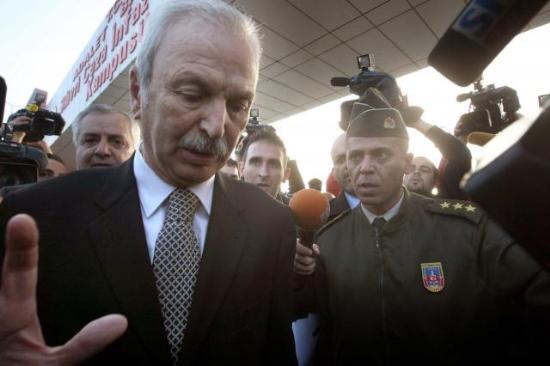
Turkish Prosecutor Indicts Another 56 Suspects in Ergenekon Investigation
Publication: Eurasia Daily Monitor Volume: 6 Issue: 49
By:

On March 10 the Istanbul Prosecutor’s Office submitted its long-awaited second indictment in the case of Ergenekon, a clandestine organization with members from various state agencies, including the military, charged with plotting to overthrow the government (all dailies and local news channels, March 10). Tuesday’s 1,909-page indictment is the second to be released by prosecutors since the investigation of the Ergenekon network was launched in June 2007, when police discovered a stash of grenades and bomb-making materials in an Istanbul suburb.
The indictment brings charges against 56 individuals, of whom 21 are already in custody and 35 released while awaiting trial. Those indicted include active and retired officers, journalists, businessmen, academics, and ordinary criminals detained or arrested in police raids between July 10, 2008, and the beginning of this year (Sabah, March 11).
A trial of 86 suspects is currently underway in the 13th Higher Criminal Court of Istanbul in the nearby suburb of Silivri. The defendants were indicted in a 2,455-page document made public last summer; and 46 of them, including retired General Veli Kucuk, are presently in jail. They are charged, among other things, with forming or being a member of a terrorist organization, inciting public unrest, and encouraging disobedience in the military with the aim of toppling the pro-Islamic ruling Justice and Development Party (AKP). The specific charges include plotting to attack a NATO base in Turkey as part of a series of bloody assaults aimed at creating a serious crisis, chaos, anarchy, terrorism, and instability.
The Istanbul Prosecutor’s Office announced the second indictment in a press release on March 10 but declined from giving details until the Istanbul court decides, by March 25, whether to bring the 56 accused to trial. Twelve of those named in the new indictment face charges of holding leadership positions in the organization, while 40 are allegedly members of the network. Four are suspected of aiding and abetting Ergenekon.
The 12 suspected leaders are accused of attempting to overthrow the Turkish Parliament and the government of the Republic of Turkey or blocking it from functioning completely or partially, inciting people to armed revolt against the government, sharing documents pertaining to state security, acquiring such documents, tapping people’s phones and bugging their homes, attempting to influence the judiciary, and falsifying official documents (Sabah, March 11). Other suspects are being charged with membership in the organization, tapping people’s phones and bugging their homes, possession of illegal narcotics, and violation of the Firearms Law (NTV, March 10).
The indictment seeks a sentence of life imprisonment for the 12 suspects.
Retired generals Sener Eruygur and Hursit Tolon were allegedly named in Tuesday’s indictment as being among the leaders of the organization (Milliyet, Sabah, March 11). They are among three retired generals, in addition to several active and retired officers of various ranks, who were detained and imprisoned last July. Both generals were later paroled for health reasons.
The new indictment accuses Ergenekon of some of the most violent attacks and murders in Turkey’s recent history, including the Gazi events of 1995, in which 17 people were killed in Istanbul’s Alevi-dominated Gazi neighborhood when unidentified gunmen opened fire on a local cafe (Today’s Zaman, Milliyet March 12).
Other accusations against Ergenekon in the new indictment include organizing the Sivas massacre of July 2, 1993, which resulted in the deaths of 37 Alevi intellectuals; the execution of 33 soldiers by firing squad in 1993 on the Bingol-Elazig highway by the outlawed Kurdistan Workers Party (PKK); the assassination of the commander of the Diyarbakir Regional Gendarmerie, General Bahtiyar Aydin, in the Lice district of Diyarbakir on October 22, 1993; and the violence that broke out in Umraniye Prison during simultaneous operations by the police in Turkish jails on December 19, 2000, following mass demonstrations and hunger strikes by inmates that began the previous October to protest the new F-type prison facilities (Today’s Zaman, Milliyet, March 12).
The indictment released on March 10 has allegedly linked Ergenekon with the PKK as well as with the extreme fundamentalist organizations Hezbollah and Hizb ut-Tahrir (NTV, March 12). It has also demanded an investigation into the alleged aborted coup attempts of 2004, code named Sarikiz (Blond Girl) and Ayisigi (Moonlight) (NTV, March 12).
Former Chief of General Staff General Hilmi Ozkok, retired, neither confessed nor denied claims that certain senior army generals were planning to engineer coups against the ruling AKP government (Milliyet, July 10, 2008). The Turkish Armed Forces have toppled four governments by hard and soft coups over the past 48 years. Last April 27 they issued a memorandum against the government, detailing its alleged non-secular activities.
If there are no additional waves of operations in the Ergenekon investigation, a third indictment is expected to be released against 77 suspects, 48 of whom are in jail (Star, March 11). That will bring the total number of Ergenekon suspects to 219.
In a related development, bone fragments, hair, a glove, and a beret were found during a ground excavation of a courtyard at a restaurant 15 kilometers from Sirnak Province in the Kurdish-dominated southeast (NTV, March 12). Bone fragments and clothing were also found in a separate excavation of wells at a military outpost near the state-owned Turkish Pipeline Corporation (BOTAS) in Silopi, Sirnak Province (Sabah, March 11). They have been sent to the Istanbul Forensic Medicine Council for an analysis of whether the bones are human (Today’s Zaman, March 11).
The excavation of wells located at sites belonging to BOTAS started early on March 9, in a search for victims of alleged murders by an illegal group within the gendarmerie called JITEM (Gendarmerie Intelligence and Counterterrorism) set up in the late 1980s to stifle ethnic separatism in the southeast. Atilla Ozturk, the chief public prosecutor of the southeastern province of Sirnak, and four attorneys are supervising the excavations (Today’s Zaman, March 11). It was alleged that JITEM summarily executed a large number of people, doused their bodies with acid, and buried them in wells near BOTAS facilities in several southeastern cities (Today’s Zaman, March 11).




